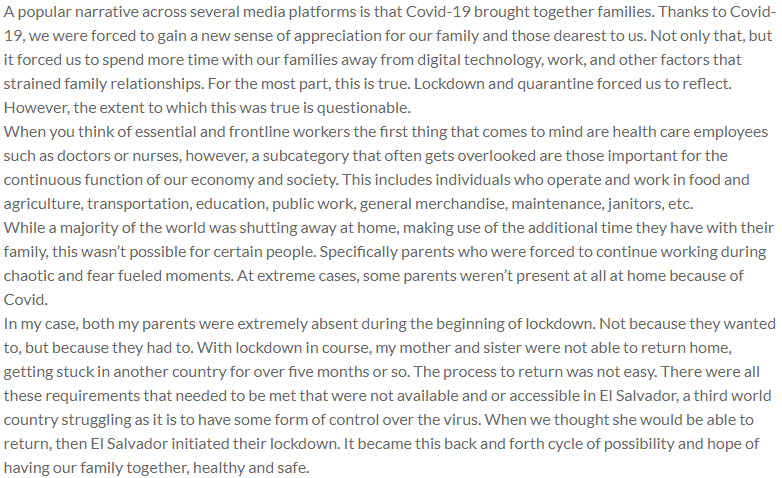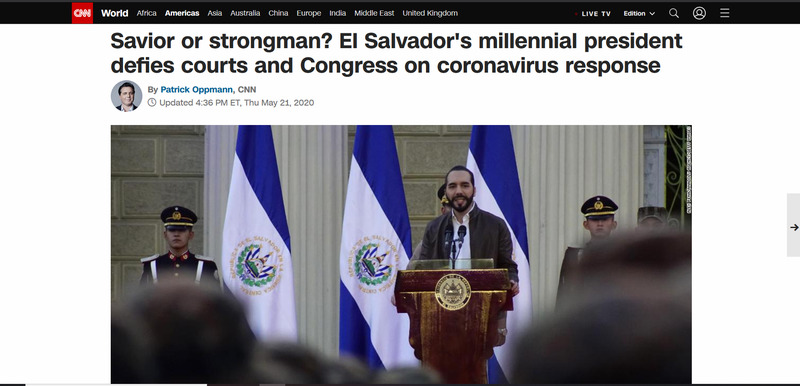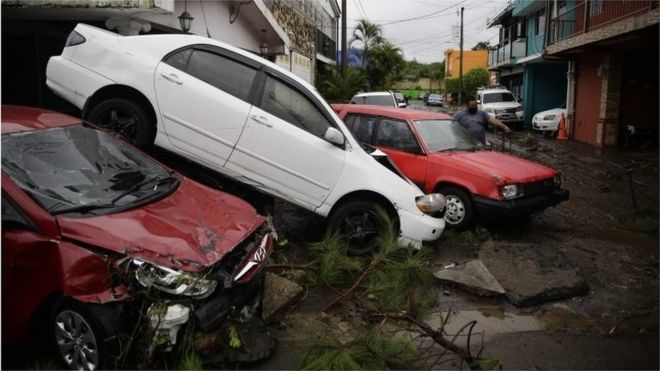Items
Tag is exactly
El Salvador
-
2020-06-22
Milestone Year
To get to this story, I have to go back a few years first. I'm an immigrant from El Salvador. I came to the U.S. as a teenager in 1994, and never went back. I was in my 30s when I decided it was finally time to visit the grandmother I'd been missing for so long. I started to save and plan. Then she died. It took several years before I finally took my first trip back in November of 2019. I spent the time vacationing on the coast. I avoided my grandmother's house, my friends, and my family. I wasn't ready. But I decided that for my 40th birthday, in 2020, I'd return for a longer stay and visit my childhood home and all the friends and family left behind. Then there was a pandemic. The trip was cancelled, but it was the least of that year's problems. I lost my job and went back to school to start a new career. Our dog got cancer and died. My partner had a friend in El Salvador who died of COVID. I can never reschedule that same trip. Too much has changed. I'm planning to return this summer. This time with a firmer grasp on life's impermanence. I want to visit the white sand beaches at Playa Mango before it gets turned into a "surf city" tourist trap. I want to visit all the important cultural landmarks, especially those from which I can learn about my ancestors. More importantly, I will not avoid friends and family. On the contrary, I want to cherish the time I will have with them as if the next day isn't guaranteed. I plan to take dozens of photographs, portraits of everyone I see, I want to write down their stories in my journal, I want to record every visit, every meal, every experience possible in my journal. I plan to say "see you later," but not leave anything unsaid. Just in case. -
 2022-05-04
2022-05-04Families during COVID
A popular narrative across several media platforms is that Covid-19 brought together families. Thanks to Covid-19, we were forced to gain a new sense of appreciation for our family and those dearest to us. Not only that, but it forced us to spend more time with our families away from digital technology, work, and other factors that strained family relationships. For the most part, this is true. Lockdown and quarantine forced us to reflect. However, the extent to which this was true is questionable. When you think of essential and frontline workers the first thing that comes to mind are health care employees such as doctors or nurses, however, a subcategory that often gets overlooked are those important for the continuous function of our economy and society. This includes individuals who operate and work in food and agriculture, transportation, education, public work, general merchandise, maintenance, janitors, etc. While a majority of the world was shutting away at home, making use of the additional time they have with their family, this wasn’t possible for certain people. Specifically parents who were forced to continue working during chaotic and fear fueled moments. At extreme cases, some parents weren’t present at all at home because of Covid. In my case, both my parents were extremely absent during the beginning of lockdown. Not because they wanted to, but because they had to. With lockdown in course, my mother and sister were not able to return home, getting stuck in another country for over five months or so. The process to return was not easy. There were all these requirements that needed to be met that were not available and or accessible in El Salvador, a third world country struggling as it is to have some form of control over the virus. When we thought she would be able to return, then El Salvador initiated their lockdown. It became this back and forth cycle of possibility and hope of having our family together, healthy and safe. My father on the other hand had to continue showing up to work, working ridiculous hours. When the whole world including my father was consumed by fear and confusion, there was no room to process and plan. My father, an employee of a multinational beverage corporation, experienced no change in his routine. On the contrary, besides wearing a mask, everything remained the same; crowded working spaces, no social distancing, etc. My sisters and I questioned why he continued to go to work knowing the danger that posses to not only his health and safety but also ours. His reason was “because the world doesn’t stop. There are still expenses and bills to pay regardless so not showing up is not an option.” This made me question just how many parents continue to work because they need the money to survive, especially at the beginning of the pandemic when many businesses were taking advantage of the short supply of items such as disinfecting spray, wipes, toilet paper, etc. and committing price gouging, knowing people were desperate for such things. That being said, stories as such continue to expose the disproportionate disadvantages that many low income communities and working classes face. Not only that but the additional strains placed on several families because of Covid and just how important resource and accessibility is. -
 2020-05-21
2020-05-21“Savior or strongman? El Salvador's millennial president defies courts and Congress on coronavirus response”
Aside from being the death of hundreds of thousands, COVID-19 may also be the impetus for the decline of democracy in El Salvador, one of the smallest countries in Latin America. In an article for CNN, journalist Patrick Oppmann provides a brief summary of how El Salvador’s populist president, Nayib Bukele, is taking advantage of the pandemic to attack the nation’s political institutions and consolidate personal power. Ever since he was elected as a political outsider in 2019, President Nayib Bukele has utilized social media to attack his political opponents and journalists, who he believes are obstacles to his personal agenda. He also marched soldiers into the National Assembly to intimidate lawmakers into signing a bill to increase police and military funding, arousing the fear of those who remembered El Salvador’s history of military dictatorships. The emergence of COVID-19 has given Bukele the opportunity to further attack the nation’s institutions and to consolidate his own power. He placed stringent quarantine measures and deployed military policemen on the streets to catch violators, who would then be sent to quarantine centers. Bukele also used the pandemic to go after gangs such as MS-13, whose members were rounded up and taken to densely packed prisons and stripped naked. This particular measure not only violated human rights, it also harmed efforts to reintegrate gang members, according to a former gang member interviewed by Oppmann. Despite these heavy handed measures, Bukele and his administration maintain high approval ratings. Bukele has leveraged this high approval rating to ignore El Salvador’s Supreme Court and National Assembly. The former ruled that he had no authority to extend lockdown orders, while the former proposed a bill to reopen the nation’s economy ahead of the reopening date scheduled by Bukele. Rather than acceding to their demands, Bukele had instead taken to social media, castigating both of these institutions as unrepresentative and illegitimate. Oppmann ends his article by noting that, as the pandemic continues, there will most likely be more clashes between El Salvador’s young, populist president and the nation’s other institutions. -
 2020-06-01
2020-06-01El Salvador: COVID-19 & Tropical Storm Amanda
The photograph is one of many of the aftermath of Tropical Storm Amanda in Central America, specifically El Salvador. Due to COVID-19 pandemic, the country's president has enforced strict quarantine measures. The smallest country in Central America has recently been hit with a tropical storm resulting in many landslides and destruction of homes. Many have been displaced and are having a hard time finding food. -
2020-05-24
Children Face Deportation Because of COVID-19 Policy
NowThisIsPolitics social media post- video
